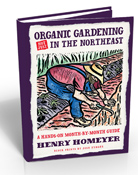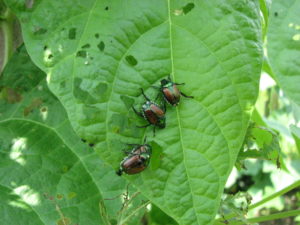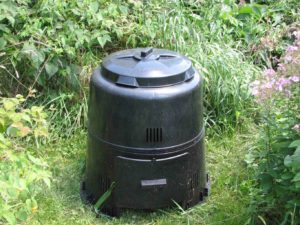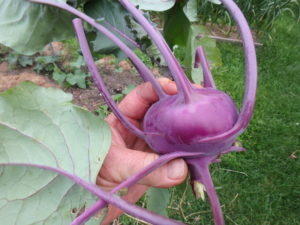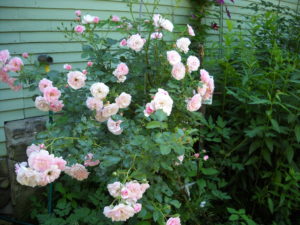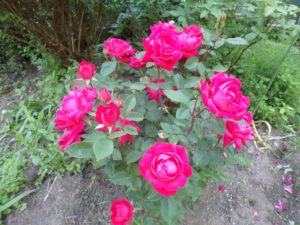7 Resolutions We Can Keep
The holidays have come and gone. Resolutions have been made and broken. Now we New England gardeners are faced with that long, dismal wait before we can start our gardens, and it’s a good time to think about those resolutions we never made: the garden resolutions. If you make – and follow – some of the resolutions below, you’ll not only feel virtuous, you’ll be a better gardener.
Resolution #1. Take the pledge to be an organic gardener. That means using NO CHEMICALS in the garden, no matter how dire the circumstances. Japanese beetles devouring your roses? Get up earlier and handpick them every morning. Weeds in the walkway? No herbicides. Pour boiling water with salt on them, or yank ‘em. Burn them with a blow torch. And forget 10-10-10: no chemical fertilizers, either. There are lots of easy solutions – if you know what to do.
Resolution #2. Read more about organic gardening in this down time before we plant spring seeds. Go to your local library or family-owned bookstore and see what’s available.
Are you a vegetable gardener? Get a copy of Ed Smith’s The Vegetable Gardener’s Bible (Storey Publishing). Ed and his wife, Sylvia live in Vermont and largely live on what they grow. It is well illustrated, and full of fabulous information. They are all, organic, too. This book has stayed in print for 19 years and sold over a million copies.
Another good book to obtain is “Insect, Disease & Weed I.D. Guide” by Cebenko and Martin, Editors (Rodale Press). It came out in 2001, but is still readily available. Organic gardeners have to be a little bit smarter and better educated than chemical gardeners, and this book will not only help you identify pests and diseases, it will offer organic solutions. It’s easy enough to spray a pesticide on a bug, and it will die. But knowing what the bug is, a little about its life cycle, and how to combat it without resorting to chemicals is better.
Resolution #3. Use more compost. Instead of looking for a bagged fertilizer to improve your soil, think long-term. Although bagged organic fertilizers have their place in the scheme of garden things, nothing is better for your soil than compost. Compost is not high in nitrogen, but it introduces beneficial microorganisms to your soil. A teaspoon of compost can contain up to 5 billion bacteria, 20 million filamentous fungi, and a million protozoa. No bagged fertilizer can do that.
Compost also improves the tilth of your soil. Most of us have soil that is either too sandy or too full of
clay. Who do you know that has the “rich, well-drained soil” that every plant book prescribes as the appropriate soil for your favorite plant? We have to make our own soil. We have to nurture it, and improve it until we reach the age of 99, when either it is perfect, or we no longer recognize perfection. Compost helps your soil get there.
Resolution #4. Resolve to mulch more. Mulch will help to smother weeds, add organic matter to the soil as it breaks down, and reduce water loss from evaporation or run-off. Leaves are great anywhere, bark mulch is good in flower beds, and straw, grass clippings and compost are good in the vegetable garden.
Resolution #5. Decide now that you will not let any weeds flower and produce seeds. That means that you have to yank the weed or cut off any seed heads of weeds when you see them – even if you all dressed up and are leaving for the airport. You have to grab the seed heads off that big weed on your way to the car. Stuff it in your pocket, or put it in the trash. But don’t let the weeds spread their seeds.
Resolution #6. Experiment. Every year plant something new, whether a new flavor of tomato or type of zinnia. Try veggies you’ve never grown, and learn to love eating them. Kohlrabi and rutabagas are actually delicious. Try a new type of watering device, or get a new weeding tool (such as the CobraHead, my favorite). Plant a new species of tree, one that flowers.
Resolution #7. And last but not least, resolve to keep gardening fun. Don’t bite off more than you can take care of. Try not to get discouraged if beetles eat your lilies or the phlox gets moldy. Gardening is supposed to be fun – that’s why so many of us do it. Accept that organic gardeners suffer some losses and that no gardener can have success with everything. In the meantime, enjoy the winter, and learn more about organic gardening now – so you’ll be ready come spring.
Henry lives and gardens in Cornish Flat, NH. E-mail him at henry.homeyer@comcast.net.
Tips for Growing Better Roses This Summer
My grandmother and mom grew roses, even though their roses were often plagued by bugs and diseases. But in recent years the rose industry has produced a number of carefree roses that anyone with 6 hours of sunshine and even a slightly green thumb can grow.
Probably the first place to start a quest for a great rose would be at a good family-run garden center. Find the rose expert there, and ask about good varieties for your area. In general, fragrant roses tend to attract Japanese beetles and other insect pests. I personally like the ‘Knock Out” rose series. These roses are highly disease resistant and, in my experience, they attract few pest bugs. There are other disease-resistant varieties, of course.
If you live in a cold place where winters reach minus 25 or more, I’d look at the Canadian Explorer series of roses. These were developed in Ottawa, Canada and include those tough rugosa roses in their gene pool. Rugosa roses are also called beach roses, since they often grow in pure sand on the dunes of Cape Cod and elsewhere.
A good resource for selecting and maintaining problem-free roses is a book I like very much, Roses for New England: A Guide to Sustainable Rose Gardening by Mike and Angelina Chute. This book is full of information relevant to New England gardeners, and reading it would be a good way to educate yourself about roses. It reinforces what I have learned about roses over the years – and taught me some things I didn’t know.
So what do roses want? Good soil with a slightly acidic pH, plenty of sunshine, soil that is slightly moist all the time, a little fertilizer, and someone who loves them and is willing to pull off the beetles and drown them.
The soil that roses want is a good loam amended with compost. Dig a hole that is about two and a half feet wide and 18 inches deep. Keep half the soil and mix it with an equal amount of compost in a wheelbarrow or on a tarp.
You could send away a soil sample to determine the soil pH and to see what minerals are deficient, though that might take a few weeks before you get a response. Or you could just go to your local garden center and buy a kit for testing soil pH. Much of New England has acidic soil, but roses like something in the range of 6.0 to 6.8 – slightly acidic.
You can improve your soil pH by mixing in limestone (which is available in bags at your garden center). Mixing in a cup per rose is a good start, depending on your soil pH. I knew a rosarian who always buried a 4 inch square scrap of Sheetrock (wallboard) beneath each rose to provide calcium and improve soil pH over time. A cup of bone meal or rock phosphate at planting time will add phosphate, a mineral that roses need.
Roses need sunshine to do well, the more the better. The Chute’s book taught me that if you have to choose morning sun or afternoon sun, go for morning sun. That way the dew dries up more quickly – and fungal diseases, which love wet leaves, are minimized naturally. Six hours of sun is considered adequate, but the Chutes mention that roses with fewer petals need less sun to bloom.
I have a rose right near my front door – and the hose that is connected there. It has bloomed well for decades, in part, because every time I fill a bucket, wash the car or use the hose, I give the rose a nice drink. Roses love water. I have a watering wand on the hose so that I can direct water to its base, and not wet the leaves. In dry summers watering roses is key. How much? At least 5 gallons per week for a mature rose.
I rarely fertilize my roses, but the Chute’s book says that fertilizing regularly increases blooming. I might try a couple of applications of an organic liquid fish fertilizer this summer. Be aware that too much fertilizer pushes fast growth that is more susceptible to diseases and insect damage.
What else should you consider when selecting roses? I like roses grown on their own roots, not grafted onto root stock. If the plant dies down to the soil over winter, a rose will sometimes send up shoots from the roots, which are different from the rose you planted if you buy grafted roses.
Also read the tag carefully to see if it is a one-time bloomer each season, or a re-bloomer. Some roses like the Knock-Out roses bloom for most of the summer. Be sure to cut off blossoms after flowering to encourage more blossoms.
Finally, now is the season to cut off any brown, dead portions on stems – most roses suffer a little winter damage. Cut above an emerging leaf.
I’m an organic gardener which means I don’t spray my roses, not for fungal diseases, not for insect pests. I firmly believe that if you have a rose in good soil with good sunshine and adequate water, your roses will be healthy and not attract many insects.
Henry is at the Chelsea Flower Show in London this week, and will not be answering questions. Read his report on the show next week!

